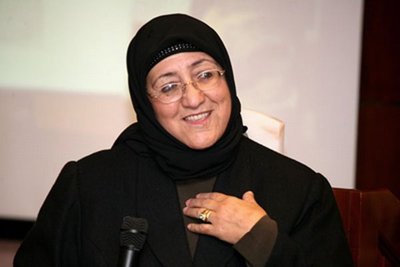January 23, 2009
Advancing the status of women in Afghanistan with Afghan leader Feb. 5
Sakena Yacoobi will offer insights into the Afghan women’s struggles 11:30 a.m. Feb. 5 in University of Washington’s Foege Auditorium as part of the Department of Global Health lecture series. Her visit is made possible by the Americans for United Nations Population Fund.
Yacoobi, director of the Afghan Institute for Learning (AIL), saw her mother almost bleed to death in childbirth because there were no attending doctors. Her mom survived, a rarity in Afghanistan where one in seven women die in childbirth, but only five of Yacoobi’s 16 siblings made it.
In 1996, Yacoobi founded the Afghan Institute for Learning, a grassroots organization that empowers Afghan women to pursue their human rights, develop leadership skills, improve their health and advance their education.
Yacoobi persevered to provide education and health service to women and girls under the Taliban, when education for females was forbidden. AIL supported 80 underground home schools for 3,000 girls in Afghanistan after the Taliban closed girls’ schools in the 1990s. Yacoobi and members of AIL coordinated with women at the community level to gain trust and support.
With a staff of 450 people, the Afghan Institute for Learning annually serves 350,000 women and children. The institute provides health education and services including midwifery, family planning and pre/post natal care to women. Through quality health services, skills training programs and health workshops, Yacoobi increases the level of education attained for women to help them reach their potential.
Under Yacoobi’s leadership, AIL has established itself as a groundbreaking, visionary organization. AIL was the first organization to offer human rights and leadership training to Afghan women.
Born in Heart, Afghanistan, Yacoobi came to the United States in the 1970s earning a bachelor’s degree in biological sciences from the University of the Pacific and a master’s degree in public health from Loma Linda University. Before returning in 1990 to work with her people, Yacoobi was a professor at D’Etre University in Michigan and a health consultant. While working with refugees from Pakistan, she published eight Dari-language teacher training guides. Yacoobi is co-founder of Creating Hope International, a Michigan-based non-profit. She is currently a member of the board of directors of Global Fund for Women and an advisor to the Women’s Learning Partnership.
Facts on Afghanistan:
- Afghanistan’s population is estimated at 31 million; 22 million people or 70% of the population live in poverty.
- The maternal mortality rate is 1,900 deaths per 100,000 live births versus 43 deaths per 100,000 in the United States.
- Less than 5 percent of the population engages in family planning, and of this only 3.6% use modern methods.
- Mean age of marriage: 17 for women, 25 for men.
- Average life expectancy for both women and men is 47 years.
- The median age of the total population is 16 years.
- 49% of women are in the labor force.
- Over 142,000 people are displaced due to conflict.
Source: Americans for United Nations Population Fund
For more information on this event, call the Global Health Resource Center at (206) 685-7362.

